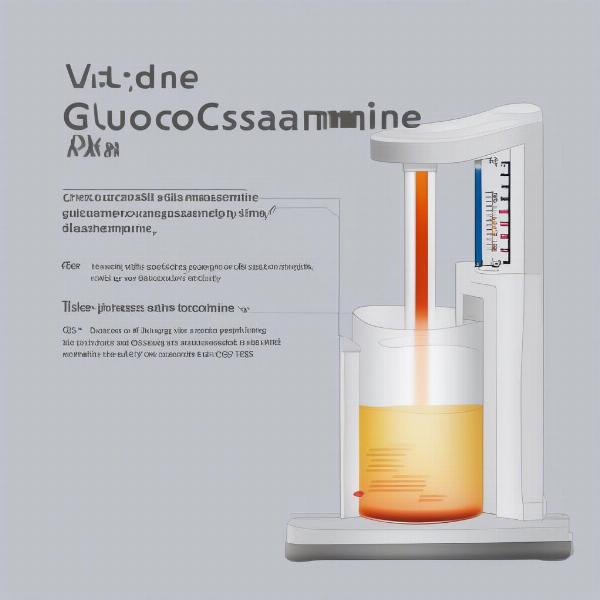Dyne for dog is a search term that often leads pet owners to information about canine supplements, specifically those related to joint health and mobility. This guide delves into the benefits and considerations surrounding the use of dyne in dog supplements, helping you make informed decisions about your furry friend’s well-being.
What is Dyne and Why is it Important for Dogs?
Dyne is a unit of force. In the context of dog supplements, it often refers to the force measurement used to determine the viscosity, or thickness, of ingredients like glucosamine or chondroitin. These substances are commonly found in supplements designed to support joint health and cartilage function in dogs, particularly those suffering from osteoarthritis or other mobility issues. The viscosity of these ingredients can be an indicator of their quality and potential effectiveness.
 Dyne Measurement for Glucosamine
Dyne Measurement for Glucosamine
How Dyne Relates to Joint Supplements for Dogs
Glucosamine and chondroitin are building blocks of cartilage, the connective tissue that cushions joints. As dogs age, or due to injury or certain breeds’ predisposition, cartilage can break down, leading to pain, stiffness, and reduced mobility. Supplements containing glucosamine and chondroitin aim to replenish these essential components and support cartilage health. The “dyne” measurement comes into play when assessing the quality and consistency of these ingredients. A higher dyne level often suggests a more viscous or concentrated form of the supplement, which some believe indicates greater efficacy. However, it’s important to remember that the dyne value alone does not determine a supplement’s overall effectiveness.
Choosing the Right Joint Supplement for Your Dog
While dyne can be a factor to consider, it shouldn’t be the sole basis for selecting a joint supplement. Other factors, such as the overall formulation, the presence of other beneficial ingredients (like MSM or omega-3 fatty acids), and the reputation of the manufacturer, are equally important. Always consult your veterinarian before starting your dog on any new supplement. They can help determine the appropriate dosage and ensure that the supplement won’t interact with any existing medications your dog might be taking.
Beyond Dyne: Other Considerations for Canine Joint Health
Supporting your dog’s joint health goes beyond just supplements. Maintaining a healthy weight, providing regular, moderate exercise, and ensuring a comfortable sleeping area can all contribute to reducing stress on joints and promoting mobility. Additionally, certain breeds are more prone to joint issues, so understanding your dog’s breed-specific needs is crucial.
Conclusion
Dyne, while often associated with the viscosity of ingredients like glucosamine in joint supplements for dogs, is just one piece of the puzzle. A holistic approach to joint health involves considering various factors, including the overall supplement formulation, your dog’s individual needs, and lifestyle adjustments. Always consult with your veterinarian to determine the best course of action for your furry companion. Dyne offers a glimpse into the quality of certain ingredients, but a well-rounded approach is essential for optimal joint support and a happy, active dog.
FAQ
- What does dyne mean in dog supplements? Dyne often refers to the measurement of viscosity of certain ingredients in joint supplements, like glucosamine.
- Is a higher dyne value always better? Not necessarily. While it might indicate a more concentrated form, the overall effectiveness depends on various factors.
- Should I consider dyne when choosing a joint supplement? It can be a factor, but it shouldn’t be the sole determinant. Consult your vet for personalized advice.
- What else can I do to support my dog’s joint health? Maintaining a healthy weight, regular exercise, and a comfortable resting place can all make a difference.
- Are all dog breeds equally susceptible to joint problems? No, some breeds are more prone to joint issues than others.
ILM Dog is your trusted resource for expert advice and information on dog care. We offer a wide range of resources covering breed selection, health, training, nutrition, grooming, exercise, and much more. Whether you’re a new dog owner or a seasoned expert, we provide practical tips and insights to help you navigate every aspect of dog ownership. For more information or personalized advice, contact us at [email protected] or call us at +44 20-3965-8624. Visit ILM Dog for comprehensive guides and resources dedicated to helping you provide the best possible care for your canine companion.